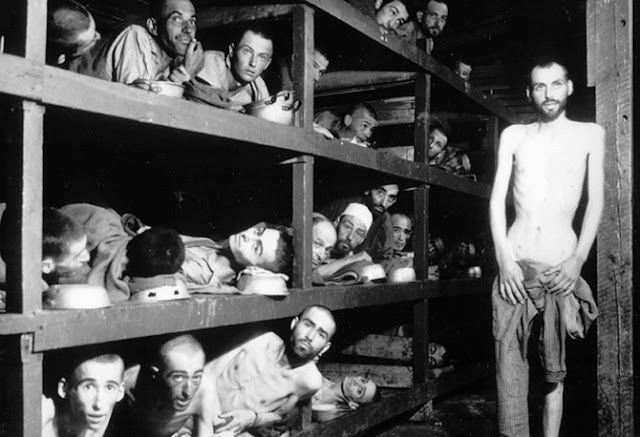We were grateful for the smallest of mercies. We were glad when there was time to delouse before going to bed, although in itself this was no pleasure, as it meant standing naked in an unheated hut where icicles hung from the ceiling. But we were thankful if there was no air raid alarm during this operation and the lights were not switched off. If we could not do the job properly, we were kept awake half the night.
The meager pleasures of camp life provided a kind of negative happiness,—“freedom from suffering,” as Schopenhauer put it—and even that in a relative way only. Real positive pleasures, even small ones, were very few. I remember drawing up a kind of balance sheet of pleasures one day and finding that in many, many past weeks I had experienced only two pleasurable moments. One occurred when, on returning from work, I was admitted to the cook house after a long wait and was assigned to the line filing up to prisoner-cook F—. He stood behind one of the huge pans and ladled soup into the bowls which were held out to him by the prisoners, who hurriedly filed past. He was the only cook who did not look at the men whose bowls he was filling; the only cook who dealt out the soup equally, regardless of recipient, and who did not make favorites of his personal friends or countrymen, picking out the potatoes for them, while the others got watery soup skimmed from the top.
But it is not for me to pass judgment on those prisoners who put their own people above everyone else. Who can throw a stone at a man who favors his friends under circumstances when, sooner or later, it is a question of life or death? No man should judge unless he asks himself in absolute honesty whether in a similar situation he might not have done the same.
Long after I had resumed normal life again (that means a long time after my release from camp), somebody showed me an illustrated weekly with photographs of prisoners lying crowded on their bunks, staring dully at a visitor. “Isn’t this terrible, the dreadful staring faces—everything about it.”
“Why?” I asked, for I genuinely did not understand. For at that moment I saw it all again: at 5:00 A.M. it was still pitch dark outside. I was lying on the hard boards in an earthen hut where about seventy of us were “taken care of.” We were sick and did not have to leave camp for work; we did not have to go on parade. We could lie all day in our little corner in the hut and doze and wait for the daily distribution of bread (which, of course, was reduced for the sick) and for the daily helping of soup (watered down and also decreased in quantity). But how content we were; happy in spite of everything. While we cowered against each other to avoid any unnecessary loss of warmth, and were too lazy and disinterested to move a finger unnecessarily, we heard shrill whistles and shouts from the square where the night shift had just returned and was assembling for roll call. The door was flung open, and the snowstorm blew into our hut. An exhausted comrade, covered with snow, stumbled inside to sit down for a few minutes. But the senior warden turned him out again. It was strictly forbidden to admit a stranger to a hut while a check-up on the men was in progress. How sorry I was for that fellow and how glad not to be in his skin at that moment, but instead to be sick and able doze on in the sick quarters! What a lifesaver it was to have two days there, and perhaps even two extra days after those!
All this came to my mind when I saw the photographs in the magazine. When I explained, my listeners understood why I did not find the photograph so terrible: the people shown on it might not have been so unhappy after all.
